The NFL comes to Dublin: How it became the richest sports league in the world
Listen | 26:19

Read more on post.
Fed up with Kingspan shares drifting behind peers and the wider market, Gene Murtagh is seeking to tap into some of the energy of the Magnificent Seven (Mag-7), the US tech stocks that have driven a three-year bull run across global equity markets.
The Kingspan chief executive revealed on Tuesday that the insulation giant founded 60 years ago by his father, Eugene, plans to float 25 per cent of its advanced building systems unit Advnsys, which is focused on supplying the global data centres boom, in Amsterdam.
The mushrooming of data centres has been turbocharged by the artificial intelligence (AI) revolution that has driven the share prices in recent times of Mag-7 stalwarts such as chipmaker Nvidia, Microsoft, Google-parent Alphabet and Meta, owner of Facebook and Instagram.
Close to $7 trillion (€6 trillion) will need to be spent on data centres globally by 2030, driven by demand for hubs equipped to handle AI processing loads, McKinsey, the management consultancy firm, estimated in a recent report.
“We’re acutely cognisant of the fact that relevant sector peers – and these are not building sector peers, they’re tech-end peers that are supplying the data centre market – are trading at and above 20 times Ebitda,” Murtagh said on a call with analysts, referring to how others in the data centre space are being valued by the stock market at more than 20 times earnings before interest, tax, depreciation and amortisation. Valuing Advnsys along these lines would give it an initial market capitalisation of at least €6 billion.
[ Kingspan shares soar on potential €6bn flotation of unit riding data centres boomOpens in new window ]
Kingspan had lost more than a third of its market value in the four years before the move was announced – and was down 21 per cent on the year as it grappled with what Murtagh recently described as an ongoing “pretty unforgiving environment” for construction suppliers globally as households and businesses fret about a potential recession. The group is trading at about 10 times Ebitda – compared with its 10-year average of 13.5.
Compare that with Vertiv, an Ohio-based provider of critical infrastructure and services for data centres, whose stock has soared more than 400 per cent over the past four years.
Or with Trane Technologies, the Swords-headquartered but New York-listed maker of heating and cooling systems for commercial buildings, whose market value has more than doubled in the same period, to $90 billion, amid a surge in demand for its data centre air-cooling systems.
Listen | 26:19
The AI boom – like red-hot stock market trends before it – has attracted blatantly cynical pivots and rebrands from companies trying to jump on the bandwagon.
But Kingspan has been a supplier to the data centres market since before Murtagh became CEO 20 years ago. The new Advnsys unit being lined up for an initial public offering (IPO) – which combines its data centre solutions and light, air and water businesses into one – is a world leader in bespoke critical infrastructure primarily focused on data centres, ventilation and daylighting.
[ Kingspan trades profit for position in US roofing raceOpens in new window ]
While about 40 per cent of Advnsys’s earnings currently come from providing infrastructure to the tech sector, particularly to data centres, this is expected to grow to about 75 per cent of an even bigger business in the next three to five years, according to the group.
Citigroup analysts reckon the subsidiary could more than double its revenue and Ebitda between 2024 and 2030, to €3.2 billion and €525 million, respectively.
Shares in Kingspan jumped as much as 13.5 per cent to €74.85 on Tuesday morning, but have since handed back almost half their gains as some analysts urged caution.
“While we understand the [market] reaction, particularly in light of the stock’s weaker performance year-to-date, we do not yet understand how a partial IPO creates additional value, nor how the market will arbitrage valuation between the two businesses,” said JP Morgan analysts led by Elodie Rall in a note to clients.
Advnsys may attract a higher valuation multiple, but this is likely to be offset by the market giving the rest of the business – comprising insulated panels, other insulation solutions and its roofing and waterproofing unit – a lower one, she said.
Bernstein’s Pujarini Ghosh said the market excitement earlier in the week had been “overdone” and her €70 price target on the group points to almost 3 per cent downside from here. A listing of Advnsys in New York “could potentially have helped unlock greater value given the business mix will be more heavily skewed to the US”, she said.
About 45 per cent of the unit’s business is exposed to the US, but this is expected to rise well above 50 per cent in the coming years.
Murtagh said the decision to float on Euronext Amsterdam is down to the high level of trading in stocks in that market, a lack of stamp duty there, too, and how the same accounting standard (IFRS) applies to companies in the Netherlands and Ireland.
For sure, the level of trading in Euronext Dublin has slumped over the past five years amid a number of company exits and a dearth of fresh IPOs.
[ How Kingspan stands to benefit from AI boomOpens in new window ]
But to avoid the 1 per cent stamp duty applied to share trading in Irish companies, Kingspan will need to incorporate Advnsys as a public limited company – or naamloze vennootschap (NV) – in the Netherlands.
A nice bonus from the planned IPO is that it would, according to Murtagh. leave both Kingspan and Advnsys “essentially with zero debt” – giving them plenty of scope to invest and grow by acquisition.
Whereas Kingspan’s share price tends to move with the broader construction industry cycle, Advnsys’s stock will be far more sensitive to developments in AI, making it potentially much more volatile.
Chinese tech group DeepSeek, for example, showed the world earlier this year that its approach to generative AI needs just a fraction of the computing power of more prominent US tools, such as ChatGPT. Could demand for data centres decline as AI systems become more efficient?
One thing’s for sure: savvy investors in Advnsys in Amsterdam will have alerts set for anything coming from another company 9,000km away. For now, Nvidia in Santa Clara, California, remains the bellwether for all things AI.

Read more on post.
The Irish company that runs the Brown Thomas and Arnotts department stores recorded like-for-like growth in revenues and profits in spite of a decline in sales of some luxury goods and a more “challenging” trading environment.
Latest accounts for Brown Thomas Arnotts Ltd show it made a pretax profit of just under €19 million on turnover of €319.3 million for the 48 weeks to last January 4th.
On a like-for-like basis, the company’s sales rose by 3 per cent while its operating profits were up 50 per cent.
The accounts also show the Irish retailer paid a €10 million dividend to its parent, Cambridge Retail Group Holding Ltd, after the year end. This was in addition to a €496,000 payment last year.
Its revenue comprised €273.8 million in retail sales and €45.5 million in concession incomes. And the company paid tax of just under €1.5 million on its profits.
The accounts cover a shorter time frame than usual as the firm changed its year-end to align with that of its parent company, the Central Group.
Brown Thomas and Arnotts are part of the same retail group as Selfridges in the UK and De Bijenkorf in the Netherlands.
Commenting on trading in the current financial year, Donald McDonald, chief executive of Brown Thomas Arnotts, told The Irish Times: “Trading has been a little more challenging but we’re still up on last year, which is quite satisfactory.
Listen | 26:19
“We are low digits [percentage] increase up on last year, 2-3 per cent up. The early part of 2024 was challenging, but we had record sales at Christmas time.
“We were close to 5 per cent up on that period and 40 per cent of our business is done in quarter four, with 25 per cent from mid November to the end of December.
“While we’re [currently] marginally up on this time last year, we still have Christmas to come and that’s the big period for us. It could all swing on that.”
Mr McDonald said sales at its Dundrum Town Centre store, which opened three-and-a-half years ago, have been “exceptional”, up 13 per cent on last year.
“We had a four-year payback on our initial €13.5 million investment in Dundrum and it has paid itself back in two years. It’s been a huge success,” he said.
Online sales, meanwhile, will break the €100 million barrier this year, in gross terms. “It’s about 16 per cent of our turnover this year and is the third biggest store after Brown Thomas and Arnotts,” he said.
“We put that [increase] down to the operational effectiveness we’ve put in place over the past two or three years.
“Ninety per cent of all our orders are now picked and ready for distribution within 24 hours. About 400,000 parcels will be distributed over the mid November to the end of December period.”
But sales of some luxury brands have softened this year, with visitor numbers from the United States and China down.
“Forty per cent of our tourism number would be US and we’re seeing a 4-5 per cent decline in that customer,” he said, saying that 20 per cent of sales at its flagship Grafton Street store would be tourist-related.
The headcount at Brown Thomas and Arnotts reduced to 1,459 last year from 1,534, while its total payroll costs amounted to €64.4 million. Directors’ remuneration was just under €1.5 million.
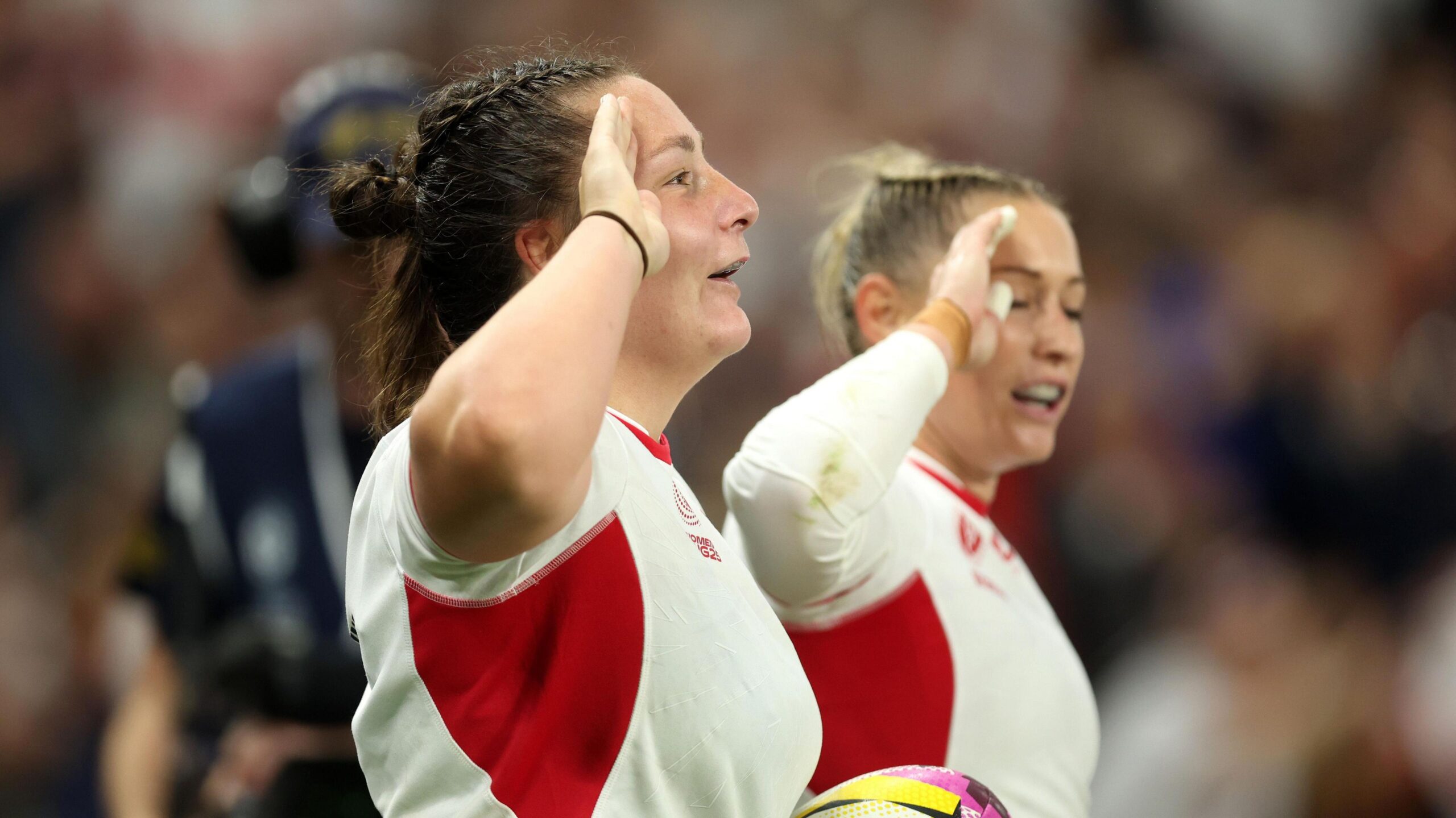
Read full article on post.
Hooker Amy Cokayne is one of the few England players to still have a day job since professionalism came into the women’s game six years ago.
The 29-year-old will play in her third successive Women’s Rugby World Cup final this Saturday, but alongside her rugby career she is also a police officer in the RAF.
The RAF’s Elite Athlete Scheme allows Cokayne to focus on her dream of lifting the World Cup while maintaining her military career in the background.
This weekend, the Flight Lieutenant will aim to keep the Canada pack in check at Twickenham, before at some point returning to her role of keeping pilots in order.
“I’ve never arrested anyone,” she told BBC Radio 5 Live’s Barely Rugby podcast this week. “I’ve done all my training, but I can’t imagine I will – I’m an officer, so I imagine I’ll just send someone.”
Cokayne, who comes from a military family, entered the RAF in 2017, after England lost the World Cup final, and even gave up rugby for a year.
“After the World Cup loss, I felt I needed something outside of rugby, to figure out a career,” she told ESPN.
“I think this has actually helped my rugby career, having that time away and realising I still love the sport. I still have that career to go back to when I hang up my boots.
“I’m really fortunate the air force support me to do rugby full time through the elite athletes scheme – but I try to help out where I can.”
It is a very different scenario now to when England last won the World Cup in 2014, where an entirely amateur side beat Canada in Dublin before going back to their daily lives shortly after.
Captain Katy Daley-McLean was a primary school teacher in Sunderland, while vice-captain Sarah Hunter was a university rugby development officer for the RFU.
Veteran back row Marlie Packer was part of the 2014 winning squad, where a week after lifting the trophy she was back at her job as a plumber – having had to take seven weeks of unpaid leave to prepare for and play in the World Cup.
“The customers I’ve been able to tell about it, they have been overwhelmed to see the medal and stuff – it’s really cool,” she told BBC News in 2014, while fixing a toilet.
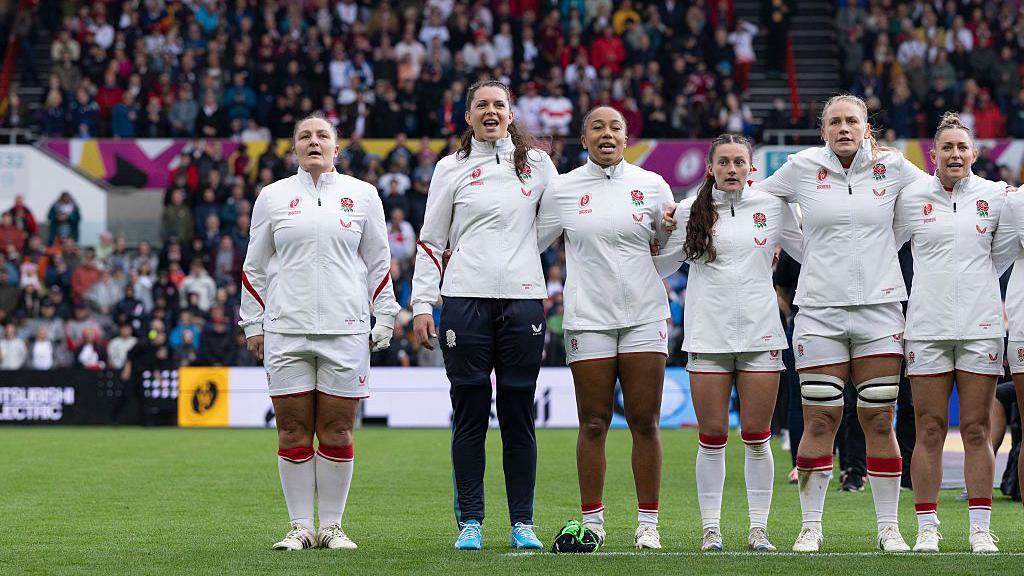 Getty Images
Getty ImagesAt the time, Packer said she was hopeful of one day being able to play rugby professionally for a couple of years before going back to plumbing. But given the change in landscape for women’s rugby in England over the past decade, she may never have to put down the rugby ball and pick up the wrench again.
“At the moment I’m doing my level three coaching award. I’ve had my level two for years,” she told BBC Radio Somerset in May.
“I think the sport has given me so much – not just to the person I am today but I’ve travelled the world, I’ve got friends all over the world.”
England are one of the very few fully professional nations in women’s rugby, which has played a part in making them number one in the world rankings and favourites for the World Cup final.
Opponents Canada, despite being number two in the world and having several players in the professional Premier Women’s Rugby in England, launched a crowdfunding campaign to boost their chances of competing against the bigger nations.
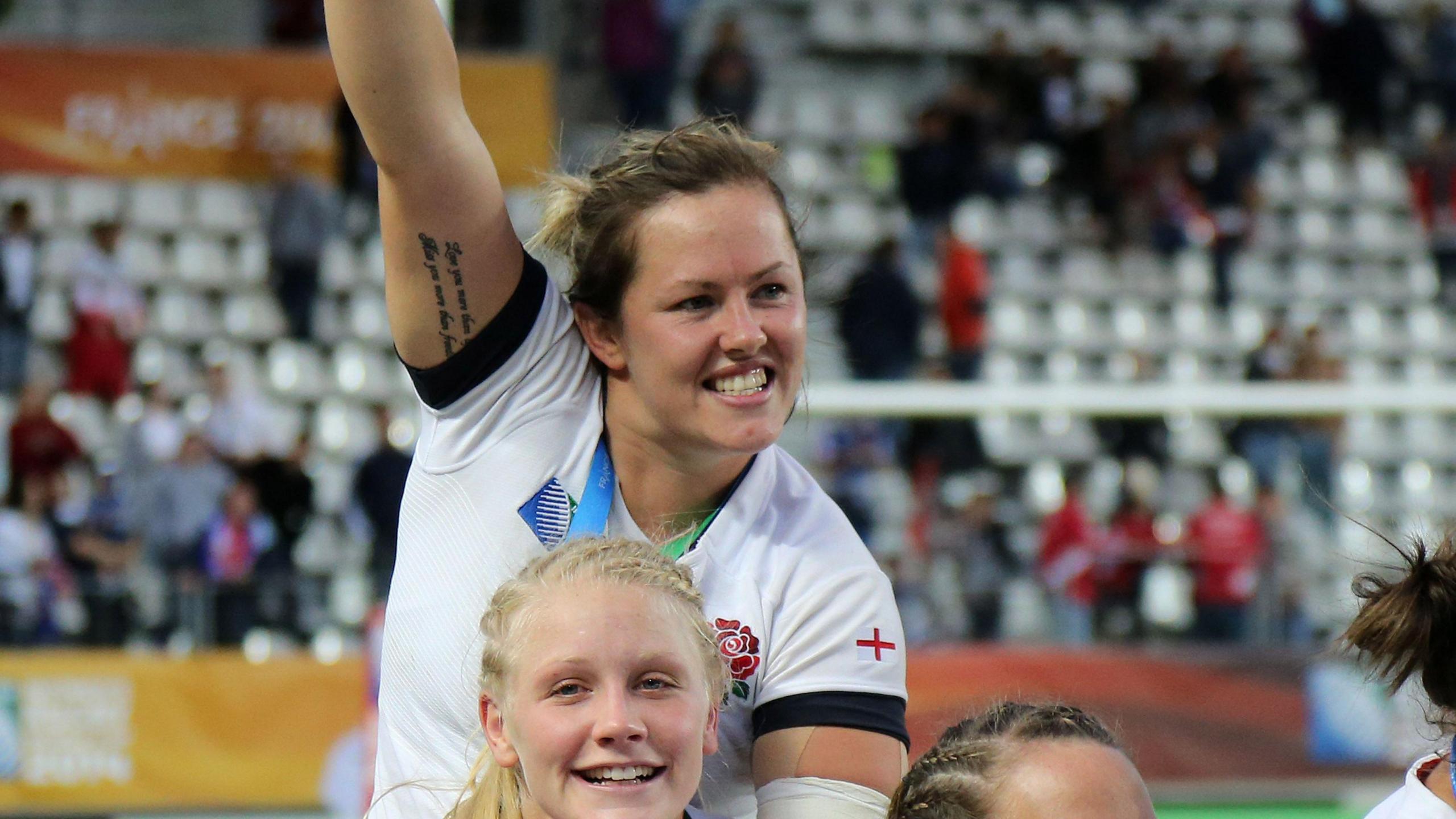 Getty Images
Getty ImagesBut while the top of the English game is able to properly support professional athletes, many of the stars who will line up at Twickenham this weekend had to find other ways to support themselves before reaching that level.
Front row stalwart Lark Atkin-Davies was a primary school teacher before she played rugby professionally.
“It’s nice to reflect sometimes and see the journey that you’ve been on,” she said.
“It’s not always been smooth sailing for me and I think there were some difficult times but obviously being professional for the last six years, I absolutely love it.
“Hand on heart, I couldn’t ask for a better job. I absolutely loved teaching and the children, but I still get those moments now when I interact with the children that come and watch the games.”
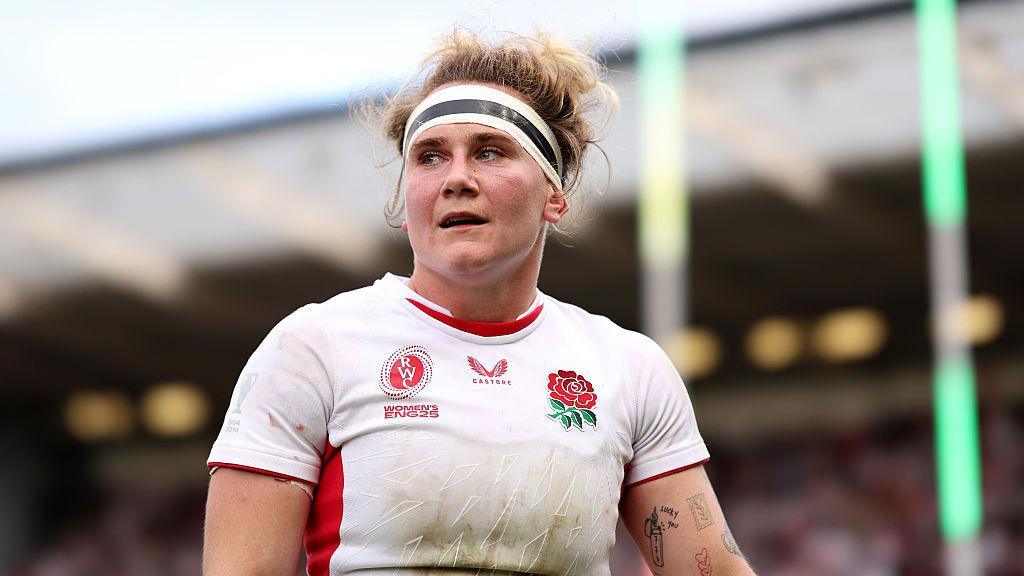 Getty Images
Getty ImagesAnother member of England’s pack, Hannah Botterman, nearly took a very different path before professional rugby arrived.
“I was a painter and decorator, proper van life,” she told the Barely Rugby podcast. “I was an apprentice for one of my mum’s friends. I was working from 7am until 4pm, then I’d do a night shift at the Harvester.
“The plan with the painting and decorating was that I would take the business on while the woman I worked for would have a baby. But then I got a contract from England and sacked it off, just as I was good enough to do it myself.”
Even the young, modern stars of women’s rugby felt the pinch of a working life when the coronavirus pandemic hit. Several players were made redundant during covid – while the RFU kept the XVs squad on furlough, those on sevens contracts were not.
Meg Jones’ speed, strength, industry and ability to be in the right place at the right time have made her arguably the best player at this World Cup.
But during Covid lockdown, she was contemplating a future working for Amazon.
“Toilet breaks are not really a thing. You’re in at 5am and then you probably leave about 4pm without having to wee,” said Jones, who by then had already been to a Rugby World Cup final. She had started the 2017 defeat by New Zealand at outside centre.
“It was scary. I’d never had another job in my life and suddenly my livelihood had gone. I just thought I was going to be an Amazon delivery driver for the rest of my life.”
On Saturday, Jones and co will instead look to deliver a first World Cup title on home soil for England.
And if so, they will all know just how hard they had to work for that achievement, on and off the field.
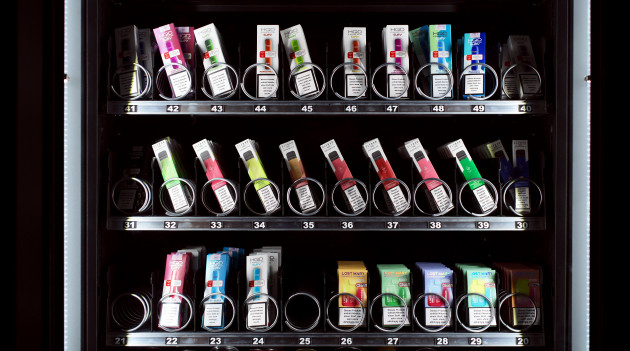
This post was originally published on this site.
CIGARETTES, TOBACCO AND vapes are banned from self-service and vending machines in Ireland from Monday 29 September.
The machines are often found in pubs and nightclubs, but the Vintners’ Federation of Ireland said their use has been decreasing in recent years.
The upcoming ban is part of the governments wider tobacco and nicotine plan, which aims to reduce smoking prevalence in Ireland to under 5%. Latest CSO figures suggest 18% of the population are current smokers.
Minister for Health, Jennifer Carroll MacNeill TD, has said the move will reduce children’s access to the products.
She said: “Sometimes children have been able to access these harmful products, this is unacceptable, and this ban will ensure that this can no longer happen.”
“This is another significant milestone in implementing our national tobacco control policy. The ban aligns with our broader public health strategy to reduce and prevent tobacco and nicotine use in society and ultimately save lives.”
Minister of State with responsibility for Public Health Jennifer Murnane O’Connor TD said vending machines have been an “avenue of easy access” to nicotine use.
She added their use has been “shown to contribute to early experimentation and long-term addiction.”
Speaking to The Journal, the Vintners’ Federation of Ireland said use of the vending machines had become less popular, but was still relied upon as a source of income for some pubs.
A spokesperson for the group said: “While the number of members using vending machines has declined in recent years, some pubs still rely on them as a small source of ancillary income.”
“We will continue to keep members informed about the change and ensure they understand their obligations under the new law.”
The spokesperson said that staff working in pubs will retain the right to access the machines.


Life, loss, fame & family – the IFI Documentary Festival in focus
European Parliament snubs Orbán with vote to shield Italian MEP from Hungarian arrest


Fatal, flashy and indecent – the movies of Adrian Lyne revisited


Key oceans treaty crosses threshold to come into force
EU renews support for WHO’s Universal Health Coverage Partnership


Twilight at 20: the many afterlives of Stephenie Meyer’s vampires


Farewell, Sundance – how Robert Redford changed cinema forever


What is KPop Demon Hunters, and why is everyone talking about it?